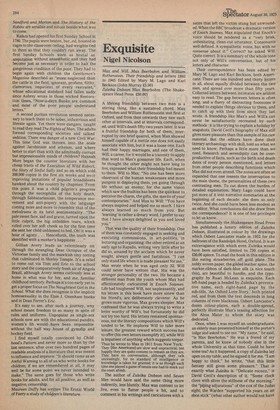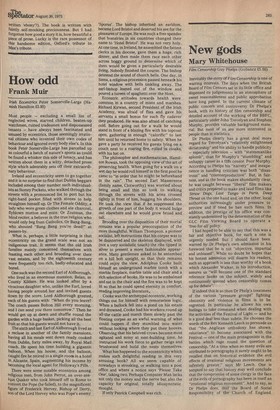Exquisite
Nigel Nicolson
Max and Will. Max Beerbohm and William Rothenstein. Their friendship and letters 1893 to 1945 Edited by Mary M. Lago and Karl BeckSon (John Murray £5.50) Zuleiha Dobson Max Beerbohm (The Shakespeare Head Press £50.00)
A lifelong friendship between two men is a stirring thing, like a sustained chord. Max Beerbohm and William Rothenstein met first at Oxford, and from then onwards they saw each other at intervals, and at intervals corresponded, until Will's death fifty two years later. It was a fruitful friendship for both of them, interrupted by one brief quarrel, when Max showed himself capable of a mettle one does not easily associate with him, but it was a loose one. Each had their happy marriages, and one of them, Will, a career, for it would be a travesty to apply that word to Max's gossamer life. Each, when he thought the other might not have long to live, expressed what their friendship had meant to them. Will to Max: "No one has been more observant of the human weaknesses and more pungent in displaying them, yet going through life without an enemy; for the same vision which saw the frailties has been the quickest to, perceive the charm, the gifts, the merits of your contemporaries." And Max to Will: "You have always inspired and helped me so much. I have always learned so much from you. But 'learning' is rather a dreary word. I prefer to say that I have always delighted in you and loved you."
That was the quality of their friendship. One of them was constantly engaged in seeking and executing commissions, in art-politics, in lecturing and organising: the other retired at an early age to Rapallo, writing very little after he did so, amazed by the acclaim which he never sought, always gentle and fastidious. "I can only stand life when it is made pleasant for me," Max wrote when he was aged only 32. Will could never have written that. His was the stronger personality of the two. He became a different man from the youth whom Max had affectionately caricatured in Enoch Soames. Life had toughened Will, not unpleasantly, and his letters in this book have more sinew than his friend's, are deliberately cleverer. As he grows more vigorous, Max grows sleepier. Max confessed that he was always trying to write a letter worthy of Will's, but fortunately he did not try too hard. His letters remained spontaneous, not the literary compositions which Will's tended to be. He implores Will to take more leisure, the greatest reward which success has to offer (his own letters exemplify it), while Will is impatient of anything which suggests torpor. Thus he wrote to Max in 1911 from New York: They [the Americans] are slow and unpractical, but happily they are quite content to remain as they are, They have no conversation, although they talk unceasingly, for no standard of intelligence or knowledge is taken for granted; it is as though each time one played a game of tennis one had to mark out the court afresh.
The author of Zuleika Dobson and Seven Men would have said the same thing more
indirectly, less bluntly. Max was content to let .live, even to flatter people a bit, and to comment in his writings and caricatures with a
satire that left the victim stung but unwounded. When the BBC broadcast a dramatic version of Enoch Soames, Max stipulated that Enoch's voice should be rendered as a "very brisk, unhesitating, clean-cut utterance. Consonants well-defined. A sympathetic voice, but with no nonsense about it." Correct? he asked Will. Quite correct. It is a summary of the whole tone not only of Will's conversation, but of his letters and character.
Their correspondence has been edited by Mary M. Lago and Karl Beckson, both Americans. There are one hundred and thirty letters in all, about equally divided between the two men, and spread over more than fifty years. Collected letters between intimates are seldom easy to read. The gap between letters is often long, and a flurry of distracting footnotes is needed to explain things obvious to them, and to catch up with their lives sincethey last wrote. A friendship like Max's and Will's can never be satisfactorily recreated by such methods : it is like trying to explain a holiday by snapshots. David Cecil's biography of Max still gives more pleasure than this sample of his raw material. But the editors have done their literary archaeology with skill, told us what we need to know. Perhaps a little more than we need. Research and serendipity can be overproductive of facts, such as the birth and death dates of every person mentioned, and letters from other people describing functions which Max did not even attend. The notes are often so• expanded that one resents the interruption to the main theme, the personalities of these two contrasting men. To cut down the burden of detailed explanation, Mary Lago could have put more of it into narrative summaries at the beginning of each decade: she does so only twice. And she could have been less modest as an editor. What conclusions did she draw from the correspondence? It is one of her privileges to let us know.
Simultaneously the Shakespeare Head Press has published a luxury edition of Zuleika Dobson, illustrated in colour by the drawings which Osbert Lancaster made in 1952 for the ballroom of the Randolph Hotel, Oxford. It is an extravagance with which even Zuleika would have been satisfied, limited to 750 copies at £50.00 apiece. To read the book in this edition is like eating strawberries off gold plate. The nobly woven paper, the gilded leather spine, the marker-ribbon of dark-blue silk (a nice touch this), are beautiful to handle, and the typography by Ruari McLean is exquisite. Each left-hand page is headed by Zuleika's provocative name, each right-hand page by the sub-title, 'An Oxford Love Story,' both printed red, and from them the text descends in long columns of even blackness. Osbert Lancaster's dozen colour-plates, each a double-spread, perfectly illustrate Max's teasing affection for the Alma Mater to whom the story was dedicated.
Once, when I was myself an undergraduate, an elderly man presented himself at the porter's lodge and asked to see me. "My name," he said, "is Max Beerbohm." He was a friend of my parents, and he knew of nobody else in the whole University at that time. Could he have some tea? As it happened, a copy of Zuleika lay open on my table, and he signed it for me. "I am happy to think," he wrote, "that this little fantasy still gives some pleasure." That is exactly what Zuleika is. "Delicate rococo," is David Cecil's description of it. "Some clock clove with silver the stillness of the morning." the "piping adjurations" of the cox of the Judas eight; the Warden "supported his years on an ebon stick" (what other author would not have written 'ebony'?). The book is written with faintly self-mocking preciousness. But I had forgotten how good a story it is, how beautiful a piece of prose. Lucky is the rare possessor of this handsome edition, Oxford's tribute to Max's tribute.



































 Previous page
Previous page